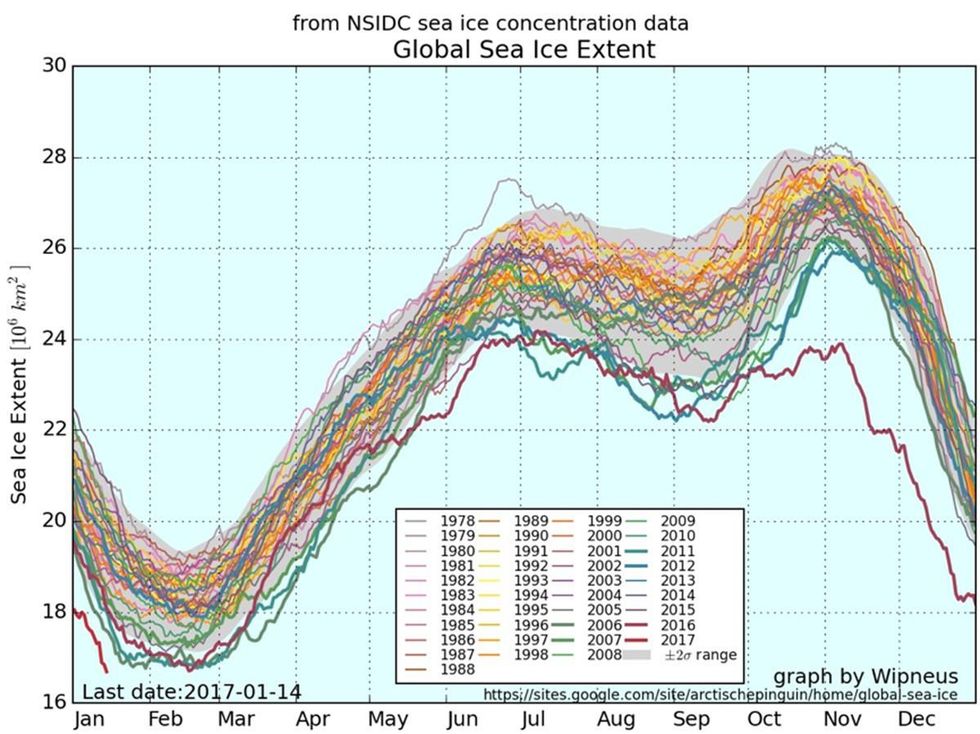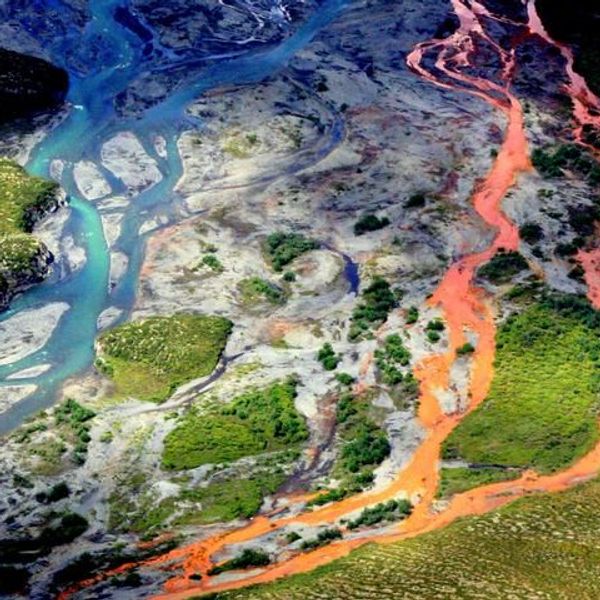Global Sea Ice Hits Lowest Levels 'Probably in Millenia'
'The human world has never experienced a time when global sea ice was so weak and reduced'
Global sea ice levels are at their lowest in recorded history, according to new statistics from the U.S. National Snow & Ice Data Center.
In the Arctic, the loss is due to climate change and extreme weather events that are likely influenced by global warming, while the changes in the Antarctic may be attributed to natural variability, the center said.

But as a result of the declines in both regions, the total loss of ice is likely at the lowest it's been for thousands of years, said meteorologist Eric Holthaus.
It's "probably the lowest in millenia," he tweeted.
\u201c@EricHolthaus "probably the lowest in millennia" sources:\nhttps://t.co/ff9OzZEcbp\nCurrent levels in context w/ 18,000yrs of reconstructions.\u201d— Eric Holthaus (@Eric Holthaus) 1484394510
Environmental and social justice writer Robert Scribbler noted that global sea ice "fell off a cliff" in December 2016--or, as 350.org co-founder Bill McKibben put it, 2016 was the year "global sea ice fell off the table."
\u201c2016--red line on bottom--was year global sea ice fell off the table. Humans 'never experienced' so little sea ice https://t.co/szRlKS3gIS\u201d— Bill McKibben (@Bill McKibben) 1484403073
"The human world has never experienced a time when global sea ice was so weak and reduced," Scribbler wrote.
That's important because, as Common Dreams has reported, sea ice loss is linked to extreme weather and rising waters, while fewer glaciers mean a darker surface of the Earth--which in turn increases absorption of the sun's energy, further fueling climate change.
Climate scientists warned last year that Arctic ice is at risk of disappearing for the first time in more than 100,000 years.
An Urgent Message From Our Co-Founder
Dear Common Dreams reader, The U.S. is on a fast track to authoritarianism like nothing I've ever seen. Meanwhile, corporate news outlets are utterly capitulating to Trump, twisting their coverage to avoid drawing his ire while lining up to stuff cash in his pockets. That's why I believe that Common Dreams is doing the best and most consequential reporting that we've ever done. Our small but mighty team is a progressive reporting powerhouse, covering the news every day that the corporate media never will. Our mission has always been simple: To inform. To inspire. And to ignite change for the common good. Now here's the key piece that I want all our readers to understand: None of this would be possible without your financial support. That's not just some fundraising cliche. It's the absolute and literal truth. We don't accept corporate advertising and never will. We don't have a paywall because we don't think people should be blocked from critical news based on their ability to pay. Everything we do is funded by the donations of readers like you. Will you donate now to help power the nonprofit, independent reporting of Common Dreams? Thank you for being a vital member of our community. Together, we can keep independent journalism alive when it’s needed most. - Craig Brown, Co-founder |
Global sea ice levels are at their lowest in recorded history, according to new statistics from the U.S. National Snow & Ice Data Center.
In the Arctic, the loss is due to climate change and extreme weather events that are likely influenced by global warming, while the changes in the Antarctic may be attributed to natural variability, the center said.

But as a result of the declines in both regions, the total loss of ice is likely at the lowest it's been for thousands of years, said meteorologist Eric Holthaus.
It's "probably the lowest in millenia," he tweeted.
\u201c@EricHolthaus "probably the lowest in millennia" sources:\nhttps://t.co/ff9OzZEcbp\nCurrent levels in context w/ 18,000yrs of reconstructions.\u201d— Eric Holthaus (@Eric Holthaus) 1484394510
Environmental and social justice writer Robert Scribbler noted that global sea ice "fell off a cliff" in December 2016--or, as 350.org co-founder Bill McKibben put it, 2016 was the year "global sea ice fell off the table."
\u201c2016--red line on bottom--was year global sea ice fell off the table. Humans 'never experienced' so little sea ice https://t.co/szRlKS3gIS\u201d— Bill McKibben (@Bill McKibben) 1484403073
"The human world has never experienced a time when global sea ice was so weak and reduced," Scribbler wrote.
That's important because, as Common Dreams has reported, sea ice loss is linked to extreme weather and rising waters, while fewer glaciers mean a darker surface of the Earth--which in turn increases absorption of the sun's energy, further fueling climate change.
Climate scientists warned last year that Arctic ice is at risk of disappearing for the first time in more than 100,000 years.
Global sea ice levels are at their lowest in recorded history, according to new statistics from the U.S. National Snow & Ice Data Center.
In the Arctic, the loss is due to climate change and extreme weather events that are likely influenced by global warming, while the changes in the Antarctic may be attributed to natural variability, the center said.

But as a result of the declines in both regions, the total loss of ice is likely at the lowest it's been for thousands of years, said meteorologist Eric Holthaus.
It's "probably the lowest in millenia," he tweeted.
\u201c@EricHolthaus "probably the lowest in millennia" sources:\nhttps://t.co/ff9OzZEcbp\nCurrent levels in context w/ 18,000yrs of reconstructions.\u201d— Eric Holthaus (@Eric Holthaus) 1484394510
Environmental and social justice writer Robert Scribbler noted that global sea ice "fell off a cliff" in December 2016--or, as 350.org co-founder Bill McKibben put it, 2016 was the year "global sea ice fell off the table."
\u201c2016--red line on bottom--was year global sea ice fell off the table. Humans 'never experienced' so little sea ice https://t.co/szRlKS3gIS\u201d— Bill McKibben (@Bill McKibben) 1484403073
"The human world has never experienced a time when global sea ice was so weak and reduced," Scribbler wrote.
That's important because, as Common Dreams has reported, sea ice loss is linked to extreme weather and rising waters, while fewer glaciers mean a darker surface of the Earth--which in turn increases absorption of the sun's energy, further fueling climate change.
Climate scientists warned last year that Arctic ice is at risk of disappearing for the first time in more than 100,000 years.

